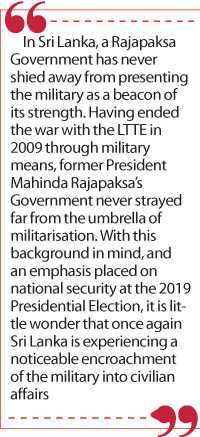Wednesday Feb 18, 2026
Wednesday Feb 18, 2026
Saturday, 23 January 2021 00:10 - - {{hitsCtrl.values.hits}}

Minister of Public Security Rear Admiral Sarath Weerasekara

Army Commander General Shavendra Silva
“Force is all conquering, but its victories are short-lived” – Abraham Lincoln, 16th President of the United States of America
 It is not unusual for a government to turn to its militaries in times of uncertainty, as an attempt to reassure both itself and the general public of the might that lies within its grasp.
It is not unusual for a government to turn to its militaries in times of uncertainty, as an attempt to reassure both itself and the general public of the might that lies within its grasp.
In Sri Lanka, a Rajapaksa Government has never shied away from presenting the military as a beacon of its strength. Having ended the war with the LTTE in 2009 through military means, former President Mahinda Rajapaksa’s Government never strayed far from the umbrella of militarisation.
With this background in mind, and an emphasis placed on national security at the 2019 Presidential Election, it is little wonder that once again Sri Lanka is experiencing a noticeable encroachment of the military into civilian affairs.
This past week Minister of Public Security Rear Admiral Sarath Weerasekara publicly declared that he would be presenting a Private Member’s Motion to Parliament which would make military training compulsory for those over 18 years of age. The outcry was immediate with many social media users decrying the attempts of what has been described as “blatant militarisation”.
If this proposal were to be adopted by the Parliament, it would place Sri Lanka in a unique group of only 28 other countries that have compulsory military service for its citizens. The countries included in the list are Russia, Iran, North Korea and Singapore. This would also see Sri Lanka with an estimated reserve armed force numbering well over 15 million, making it one of the largest in the world.
Weerasekara, when announcing his intentions, indicated that his belief was that such a training would see Sri Lanka become a more disciplined society with a greater respect for the law. This trend of thought is a continuation of the 2011 initiative which saw the then Mahinda Rajapaksa Government introduce compulsory leadership training for all undergraduates. This too was carried out by the Ministry of Defence, and faced much opposition from student unions and civil society groups. .
Prioritising the military
While the announcement by the Minister took many by surprise, it was more for the fact that this was the first open attempt by the Government to introduce a greater sense of militarisation into society. However, this is certainly not the first instance of the Government giving priority to the military over other sectors of society.
A mere four months after assuming office, President Gotabaya Rajapaksa was faced with the COVID-19 pandemic. While countries around the world scrambled to assist their medical professionals in combatting this virus, the Sri Lankan Government instead turned to the services of the armed forces.
Army Commander General Shavendra Silva was immediately placed in charge of the National Operation Centre for the Prevention of COVID-19 Outbreak, placing him ahead of medical experts in the pecking order when deciding on how best to combat the virus.
To the credit of the armed forces, they were able to lockdown the country effectively, thereby reducing the speed at which the virus spread among the populace. However, the fallacy of this decision has since come back to haunt the Government with the apparent continued presence and subsequent second wave of the virus, which has to date claimed the lives of 270 people with a further 53,750 people having been infected by the virus.
The decision by the authorities to lockdown the country was not accompanied by increased PCR testing, a call which had been echoed through the medical fraternity. As such the inevitable lifting of the nationwide lockdown has since seen the resurgence of the virus, with the past few weeks seeing as many as 500 cases reported on a daily basis.
Militaristic approach
Faced with the unknown nature of the virus and the uncertainty of how best to deal with it, the Government demonstrated its willingness to turn to the military in a time of crisis. The militaristic approach to the virus has since translated into a fear psychosis amongst the public.
The resultant attitude by people that being infected is a stigma, and with the promise of those infected being quarantined at centres run by the armed force, has led to the public no longer assisting the authorities in combating the outbreak.
Most have chosen to hide from the health authorities and the police out of fear. This is in contrast to other countries such as South Korea, Germany and Australia which have openly encouraged their citizens to be tested, with the promise that those infected will be allowed to remain in self-quarantine.
Lockdowns and isolation at quarantine centres are an approach more symbolic of a military path, as opposed to that of the medical professionals who encourage a greater degree of engagement and self-care when possible. With the authorities suggesting that many of the reported cases in the country have demonstrated mild symptoms, the continued isolation of patients will only result in a further strain on the already overworked health system.
However, rather than increasing the involvement of medical professionals, in December last year 25 military officers were appointed to coordinate island-wide anti-COVID-19 operations. Their tasks ranged from managing quarantine centres, overseeing treatment of patients to distribution of dry-rations and “other technical requirements as and when deemed necessary”.
Stepping into civilian roles
While the military has played its role in the ongoing anti-COVID-19 efforts, they have also begun to step into roles traditionally held by civilians. Successful democracies around the world have been able to separate the roles played by the military and civilians. Unfortunately for Sri Lanka, this trend seems be in reverse.
Several key ministries have seen the position of Secretary, a role traditionally occupied by Government servants, handed over to retired members of the armed forces. These include the Secretaries of Defence, Foreign Affairs, Agriculture and Public Security. While these individuals may no doubt be competent in the work assigned to them, the question is, why have the public servants been side-lined from their conventional duties?
Government servants are trained in public administration and as such their competency is determined by the training they receive. If the Government believes that there are no competent public servants in the current pool, then the priority must be to improve training to ensure that civilians continue to run these vital services.
Outside of the public service, the Military has also made its mark on tasks that have been previously dominated by civilians.
Earlier this month the Army established its new Corps of Agriculture and Livestock, which came under the Directorate of Agriculture and Livestock in the military. This new group of soldiers have been tasked with raising the country’s agricultural output and quality in keeping with the pledges made by the President.
Interestingly, rather than empowering the already existing Ministry of Agriculture to further enhance the civilian activities in this field, the Government has chosen to turn to the military in this endeavour.
Sri Lanka’s armed forces
Sri Lanka’s armed forces is estimated to number over 300,000 personnel, with a budget of Rs. 355 billion for 2021. With the country facing financial hardships, certainly a reduction in defence spending would be an option. Of course no Government would be willing to simply reduce the number of military personnel without ensuring that they are financially looked after.
As such, if the Government continues to insist on the involvement of members of armed forces in civilian activities, then it must be done so with the aim of those individuals leaving the armed services and entering full-time civilian life in their chosen fields.
However, the continuation of the advancement of the armed forces into services previously provided by civilians will see an unfair advantage handed to the State, thereby depriving the citizens of a livelihood.